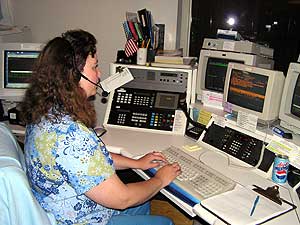|
Audio
Photos
Resources
Your Voice
|
911 call centers understaffed
September 13, 2004
 |
| Julie Fogarty has worked at the call center for 15 years. She says it's stressful, and she worries the long hours could cause people to make mistakes. (MPR Photo/Stephanie Hemphill) |
Duluth, Minn. — At the St. Louis County 911 call center near Duluth, the lights are kept low. The workers spend their day looking at computer screens, and there's less glare that way.
Five people are working this afternoon. Two are taking calls; three are relaying the information to the police and fire departments.
A call comes in. There's someone lying on the sidewalk of a busy street in downtown Duluth. In the next 10 minutes, three more calls come in to report the same thing.
Cell phones help people reach emergency services quickly. But call centers say they're often swamped when lots of people call with the same information.
 | |||
Dispatcher Edie Purcell says there's never a dull moment. People call with all kinds of problems, big and small.
"'My lights are out. I have meat in the freezer. How long will it last with the lights out?' 'My toilet is running.'"
Purcell sent a patrol car to the man with the toilet running.
"Because it was a very elderly gentleman, who was very scared, very alone, and he needed help. And the police officer went and fixed his toilet."
Purcell has been working here for 11 years. She likes the job, but lately the hours have been tough.
"I started at 2:30 this afternoon, I'll be here until 2:30 in the morning. I'll be back at 10:30 tomorrow morning and I'll be here until most probably 10:30 tomorrow night," Purcell says.
Usually the shifts last 10 hours. But this summer two people retired, and now a couple of people are on maternity leave. So Purcell and her co-workers are doing 12-hour shifts, and there's less time at home between shifts.
Julie Fogarty has been a dispatcher here for 15 years. She says it can get pretty stressful.
"There's some awful calls," she says. "A child not breathing, and you get through that one, and the next phone line rings and it's a rape victim, and it just keeps compiling."
|
I started at 2:30 this afternoon, I'll be here until 2:30 in the morning. I'll be back at 10:30 tomorrow morning and I'll be here until most probably 10:30 tomorrow night.
- Duluth 911 dispatcher Edie Purcell |
Fogarty's husband is a Duluth police officer. She's had to handle calls when her husband has been in some dangerous situations. She deals with the stress by exercising, and trying to spend as much time with her family as possible.
Fogarty sometimes worries the short-staffing could result in mistakes.
"Sometimes we're working all night, and then you have a short turnaround and you're coming back," she says. "We're human, we can only do so much."
Fogarty and her colleagues do more than handle incoming calls. They help emergency responders in the field. Dana Potvien supervises the call center.
"On a fire, we may do five-minute status checks at the request of the fire department, so they can account for all their people inside the building," Potvien says. "Or if we have law enforcement officers at the scene of a domestic incident, we'll do status checks on them every few minutes, just to make sure they're OK."
The workload here has increased partly because several cities have eliminated their local police dispatchers, turning the work over to St. Louis County.
This isn't the only call center struggling with a higher workload and lower staffing. It's a problem around the country.
Barry Furey directs an emergency communications center in Tennessee. He says it takes about a year to train a new 911 worker, and he says call centers need to get better at keeping workers once they're trained. That could mean having enough staff so people don't have to work overtime, or allowing workers to retire at 60 instead of 65.
 | |||
Furey says since the terrorist attacks, Americans are paying more attention to first responders. But it hasn't translated into any money to hire more people to help the first responders respond.
"Programs such as COPS literally put thousands of police officers out on the street, which is a good thing," Furey says. "But there wasn't one dispatcher hired by a federal program."
The National Organization of Emergency Communications Workers is surveying centers around the country. The group plans to come up with recommendations about staffing levels and how to retain workers.
A tax on phone bills helps to pay for equipment at call centers, but it's up to the local government to pay for the day-to-day operations.
St. Louis County -- like all local governments in Minnesota -- is dealing with state budget cuts, and last year the county imposed a hiring freeze.
Steve Rauker chairs the county board.
"The county board is aware that the 911 staff is having to do a lot of overtime hours, and is very concerned about potential burnout," says county board chairman Steve Rauker. "We're reaching a point where it is becoming of concern, but we do not believe that public safety is being jeopardized at this juncture."
The board recently decided to add one and a half new positions at the call center. It'll likely be close to a year before the new workers are fully trained.
|
News Headlines
|
Related Subjects
|
